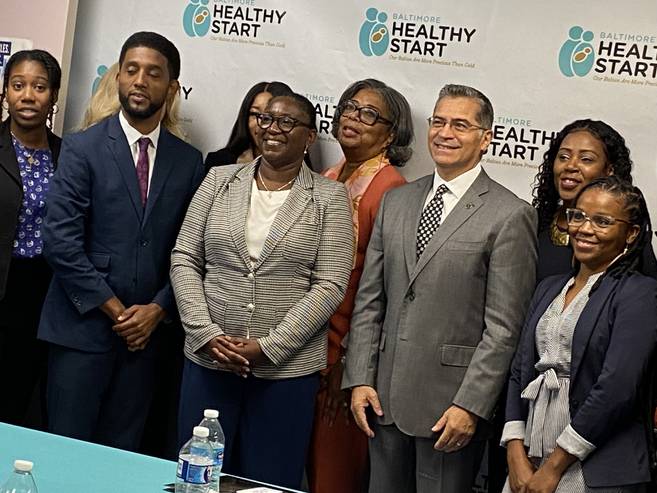
Despite years of efforts in Baltimore and around the country, Black women remain more than three times as likely as white women to die from pregnancy-related causes. But researchers at Morgan State University are pretty sure they know a way to reduce the disparities.
They want to train more doulas from Black communities.
A panel of federal and local leaders announced Wednesday that Morgan would have the chance to build a program for these non-medical professionals who provide information, support and advocacy for pregnant women and new moms. They would also coordinate a national five-year effort to create and research an array of ways to tackle systemic barriers to equitable and life-saving health care for moms and babies.
“We are going out in the community; this is applied research,” said Kesha Baptiste-Roberts, a researcher and an associate professor in the public health program at Morgan’s School of Community Health and Policy.
“Doulas are welcomed when people learn all they can do to support and advocate for pregnant people,” she said.
Morgan will coordinate the national research network of 16 sites, largely historically Black colleges and universities, announced by Xavier Becerra, secretary of the U.S. Department of Health and Human Services, at Healthy Start Inc., a federally funded Baltimore center providing services to normally underserved women during and after pregnancy.
It’s part of a $90 million federal allocation, including about $8.7 million in Maryland, that will fund other Healthy Start programs, expand the maternal health workforce, increase access to maternity care in underserved areas and address maternal depression, among other services.
The push to save more moms and babies isn’t new. Baltimore has developed programs over the years, such as B’more for Healthy Babies, that addresses safe sleep practices and other pregnancy and child care issues. But the programs have failed to fully close the disparities, and officials have seen years of successes quickly be undone.
Officials reported earlier this year that interruptions in services from the coronavirus pandemic and a spike in respiratory illnesses led to what they called an alarming and preventable surge in infant deaths. Eighteen deaths related to unsafe sleeping conditions were reported in the city and Baltimore County in December and January. That was more than they typically see in a year.
The new federal pot of money aims to build on what works and find new solutions to keep women and babies alive and healthy. It was launched under an initiative championed by Vice President Kamala Harris called the White House Blueprint for Addressing the Maternal Health Crisis.
Several area health systems were also awarded funding Wednesday, including Johns Hopkins University, the Maryland Department of Health and MedStar Health as part of the announcement in Baltimore that was also attended by Dr. Laura Herrera Scott, Maryland Health Secretary, and Brandon Scott, Baltimore mayor and soon-to-be new dad.
Sign Up for Alerts
Get notified of need-to-know
info from The Banner
Morgan State will get about $3 million to coordinate the new network. Baptiste-Roberts said the other research sites all engaged with their communities to develop a focus. Morgan settled on doulas after operating a pilot program with the nonprofit Black Women’s Health Imperative that certified university students as doulas.
She said officials had determined that some people who wanted to be doulas were having trouble gaining access to proper training to do their jobs. They also need to be certified to work with recipients receiving Medicaid, the federal-state health program for low-income residents.
The doulas provide support and comfort during and after pregnancies to women, often-times new moms who may be overwhelmed by the tasks of pregnancy, labor and child care while dealing with housing or food insecurity or other issues.
The framework for a new training program and the research element have not been worked out yet because the awards were just made. But the idea is that sites around the country will collaborate and share their work and findings over the next five years.
“This will not be a top-down program,” said Carole Johnson, administrator for the Health Resources & Services Administration, part of the federal health department. The recipients “will go to their communities and listen. What is it that works, and where are the gaps?”


